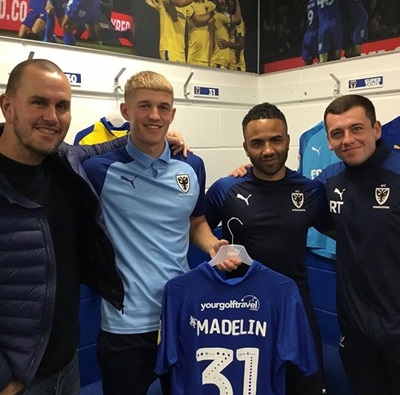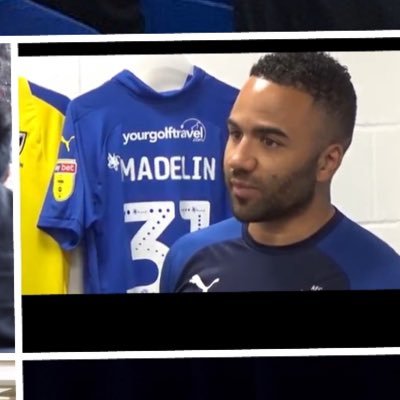
In Focus - Michael Hamilton AFC Wimbledon Academy Manager
As part of Black History Month, London FA interviewed Michael Hamilton, the Academy Manager at AFC Wimbledon. Michael reflects on his journey which led him to be where he is today.
Michael, please explain to us your journey to become an Academy Manager.

In my early 20s, I was working my way through my coaching badges and gained my experience via various community schemes and coaching companies. I then started working at the development centres at Millwall FC and quickly realised that I needed to gain experience with the older age groups if I was going to progress in this tough industry.
That’s when I contacted AFC Wimbledon and offered to volunteer my time for free as long as I could work with the older groups in the development set up. This is where I met Mark Robinson, who I ‘assisted’ with the U18s and I’ve been at AFC Wimbledon since.
I have experienced almost every role in the development programme, from age group coach to Lead Youth Phase Coach. Before I became Academy Manager, I was the Head of Coaching in the academy, where I was responsible for the coach development programme.
What do you deem as success?
Ultimately, we will be judged at producing professional footballers, that’s our first KPI, however I take great pride at watching people develop and unleashing the potential they possess. It’s well documented how many footballers the academy has developed to go on to become professional footballers, but we have also had great success at developing staff who have then been able to take their next step in their career.
We have also had players who haven’t made it as footballers, go on and have success away from football – developing the person and supporting them in being armed with the tools to succeed in life, that to me is success.
Do you feel you are a role model?
I don’t, but I occasionally get reminded of the fact that there are people who use my route as form of inspiration. I was raised in one of the roughest areas in South West London, where drugs and crime were rife. I had 2 real passions which was music and football, I found it very hard to maintain the focus needed in jobs that wasn’t to do with football or music. When my daughter was born, I had 3 jobs (including Millwall and AFC Wimbledon) meaning at times they’d overlap. Some nights, I would be operating on 3/4/5 hours of sleep a day. It would have been easier for me to find a more stable income outside of football but that’s not where my passion was. Ultimately it comes down to how much you want it and what you’re willing to sacrifice for what you want.
As one of very few black academy managers do you feel there is enough being done regarding balancing this at a national level?
It’s a shame we talk about ‘black’ because it should never be about the colour of someone’s skin, but the quality they possess. Is there more being done? There is definitely more awareness and intent to rebalance this, however we need take it away from ‘awareness’ and ‘intent’ and make it about action. If you use the ‘kneeling’ before games as an example, what does the ‘kneeling’ actually achieve? Great we are talking about it more and ‘it’s out there’ but what has actually been done? Are we educating future generations to not repeat the behaviours we are fighting against? Are we implementing impactful change, that stamps out this inequality?
Without action, the rest is irrelevant.
Why have AFC Wimbledon been so successful in producing academy players for the first team recently?
I think it’s a combination of a few things and more to be honest, the main reasons are we have a very talented group of staff who are never looking at what we have done, but more what we are going to do next. This isn’t just people who are in the building now but key staff who were here before, such as Jeremy Sauer and Mark Robinson.

We look to identify and recruit raw talent, ones that may have been overlooked by other clubs and then build a development programme around their specific needs.
It’s a combination of the above and more but ultimately you need to have a club ethos that values the need to give opportunities to its own academy talent, that is something the club demands and that goes back to the days of Wimbledon FC, which was renowned for producing its own.
Do you find their obstacles or challenges you have faced being a black coach in the pro-game and have you seen any changes to this?
I can honestly say I’ve not personally experienced obstacles, not ones that I’ve been aware of to be honest. However, I would be lying if I didn’t feel the sense of responsibility in making sure I pave the way for people to follow, just like ‘black’ coaches before me. Again, it’s a huge shame we are referring to colour, but the issue isn’t the topic but instead the need for the topic to be discussed.
If you could sum up yourself in 3 words what would they be?
Hardworking, motivated and dedicated.
If you could give some advice to another black person coming through what would you tell them?
To be the hardest worker in the room, you have 2 ears and 1 mouth for a reason, so listen and take on board as much information as possible and to identify the more you know and find out, the more you realise you know nothing, so keep learning.

